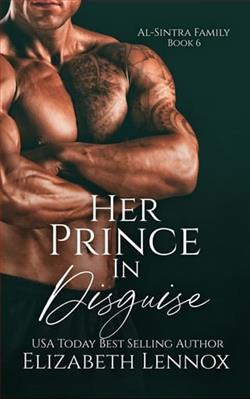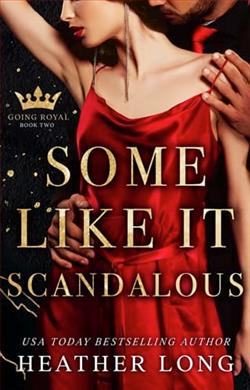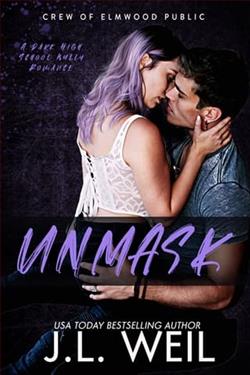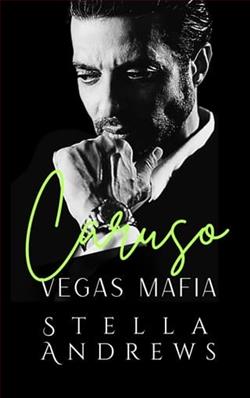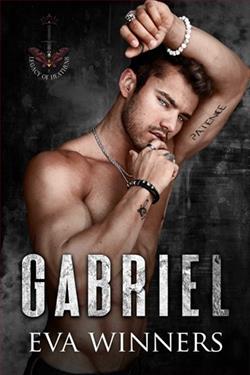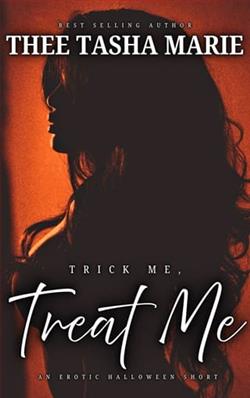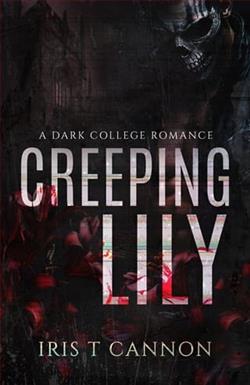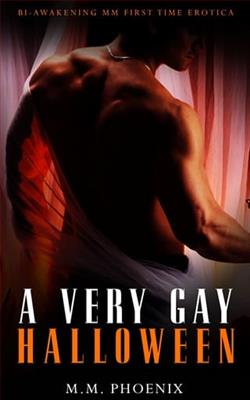Page 71 of Like a Love Story
I melt into his arms. I want him so bad. I want him to ravish me. I let him put a hand down my pants, feelingthe smoothness of my skin in his palms. He laughs.
“What’s so funny?” I ask, blushing. “Is it me? I sound silly trying to be sexy, don’t I?”
“You don’t need to try to be sexy,” he says with sweet sincerity. “Youaresexy.” He takes a breath, then laughs again. “It’s just... Is there anything gayer than the two of us holding each other in the costume room?” he asks.
I laugh too, but there’s sorrow behind the laughter.
“Hey, can I tell you a secret?” He holds my gaze with intensity.
“Of course,” I say. “You can tell me all your secrets.”
He turns his head toward my ear, then whispers, “I’m more patient than I seem. I’ll wait for you. And in the meantime, I will eat your liver.”
Art
I’m so in love with Reza, I feel like I’m bursting with it. But I haven’t been able to say it to him yet. Maybe I’m afraid it’ll scare him off. Or maybe I’m afraid that saying it out loud will break the spell. That’s what it feels like. Like we’re under a magic spell.
I live to make him laugh. If I could bottle those moments of laughter, I would turn them into a cologne and spritz myself with it every day, or I would turn them into bath suds and soak myself in his essence. But all this love only makes me want to fight harder, because if love isthisbeautiful, then anyone standing in the way of it is even more evil than I thought. All those homophobes in government, all those pharmaceutical companies profiting from our illness, all those parents kicking their children out of their homes, all those high school bullies tormenting the gay kid. My own parents, who won’t say Reza’s name, or allow him into their home, or even lookme in the eye anymore—someone should make a horror movie about them, but it would probably be too scary. People want their villains to look like Freddy Krueger and Jason. They don’t see killers in pearls and tailored suits.
My anger isn’t reserved for them, though. I have stores of it saved up for others. For Mrs. Starr, who wouldn’t let me create an ACT UP affinity group. For Darryl Lorde and all the assholes at school, who sneeze and cough words like “faggot” and “pansy” into their hands when Reza and I walk by.
And for Judy, who hasn’t spoken to me since December, who avoids my gaze just like my parents, and who has quickly replaced me with a group of boring girlfriends. Annabel de la Roche is her best friend now. They do everything together. Judy always hated girls like Annabel, with her blow-dried hair and her sleek gray-or-beige clothes and her simple makeup. Classic. Effortless. Boring. Not to mention Annabel dated none other than Darryl Lorde freshman year. Now Judy and this beige lover of homophobes are best friends? I know I wronged Judy, but months have passed. I called and left messages. I dropped notes in her locker. I admitted what I did was wrong. I told her I loved her. I even gave her a first-edition copy of Shel Silverstein’sThe Missing Pieceand inscribed a note telling her that she was my missing piece.
And nothing from her. Not a word. Not even an acknowledgment. Silence. So yeah, I’m angry with her too. I’m pissed off that she won’t forgive me. Aren’t friendssupposed to forgive each other? I’m pissed off that because of her, I’m not invited to Sunday movie nights anymore. That I don’t get to share my first love with my best friend, because, well, because he was her first love too. But still...
Sometimes, I even get pissed off at Reza. Probably too often. I didn’t know before this how frustrating love is, how crazy it can make you. Like now, we just got out of the movies. We went to seeLongtime Companion, me and Reza and Stephen and Jimmy, and we cried and cried through the movie. It’s about a group of gay men and their one straight female friend, and it’s about the first years of AIDS, and about death and friendship. I can’t believe this movie about fags dying was made. I cried because the movie was so beautiful, and because the story was so poignant, and because the character Mary-Louise Parker played reminded me of Judy and I miss her. But also I cried just because this movieexistsnow, and if this one was made, then maybe more will be made. Maybe gay stories will be told.
Then Reza asks, “Do you think the people who need to see this movie will see it? I hope it is not just a gay movie.”
“What does that even mean?” I burst out. “JUST a gay movie?”
Reza stumbles over his words. “I meant, I don’t know, that...”
“Thisisa gay film,” I say. “And I want things labeled as gay. Books and movies and all that. Don’t we deserve our own stories?”
I can feel Reza tense a little. He can’t handle this side of me. Stephen puts a palm on my shoulder.
“You could argue,” Jimmy says, intervening to restore peace, “that it is a story about friendship, about life and death. That those themes are universal.”
“Yeah,” I say. “About GAY friendship. About GAY life. And GAY death. Don’t you want black films to be called black films, Jimmy?”
“I do,” Jimmy says. “But what’s a black film, anyway? IsThe Color Purplea black film when it was directed by a straight white man? I loved that shit and Oprah was robbed, but the whole film is viewed through the lens of a white person. Perspective matters.”
I think back to photographing Jimmy for my project, of posing him like Diana Ross as Billie Holiday, per his request. Of setting up the lighting to frame his face in an otherworldly glow and finding the perfect angle. Did I capture the true him? Could I? Then I remember what Stephen told me once. That photographs say more about the photographer than they do about the subject. And if that’s true, I hate that. Because I don’t just want to photograph myself.
“I’m sorry,” I say to Reza. “I’m just angry that the straightness is implicit in everything, that there are so few queer stories. I’m not angry at you.”
Reza nods. “It’s okay,” he whispers. “I see what you’re saying.”
Stephen smiles. “Isn’t the world more interesting whennot everyone thinks like us?” he asks, clearly directing his question to me.
“Said the ACT UP activist who storms the offices of people who disagree with him,” I snap back. What’s wrong with me? I just apologized to Reza, and now I’m picking a fight with Stephen.
“Art, there’s a difference between denying sick people access to life-saving drugs and expressing an opinion about how to define-queer film,” Stephen says tiredly. “Pick your battles.”
Jimmy asks Reza a question about Iranian cinema, and the two of them walk ahead of us, leaving me alone with Stephen. I feel like an idiot. “What are you and Judy watching tonight?” I ask, changing the subject.
It’s Sunday afternoon, and I know Judy will go to her uncle’s tonight, that they will continue a tradition I was once a part of.








